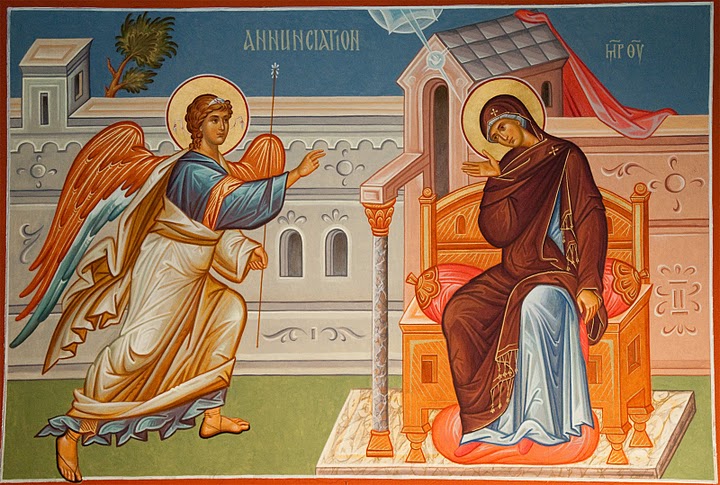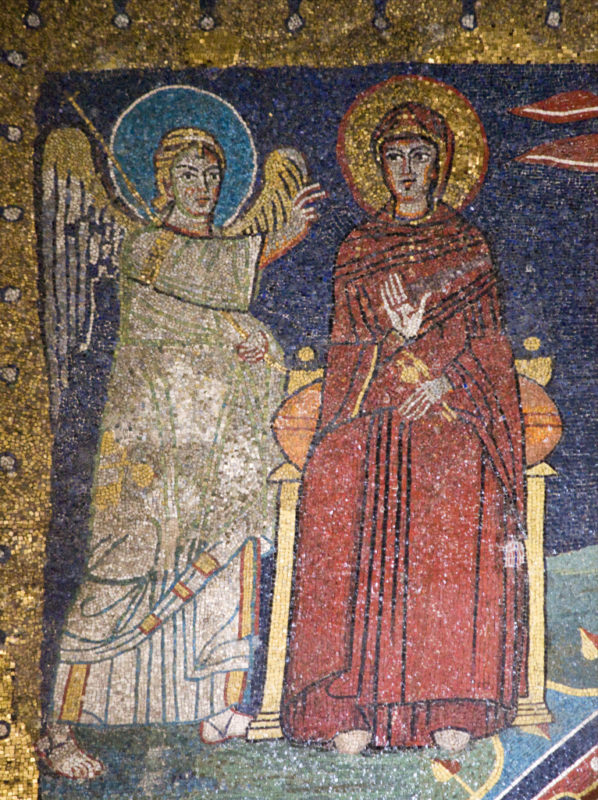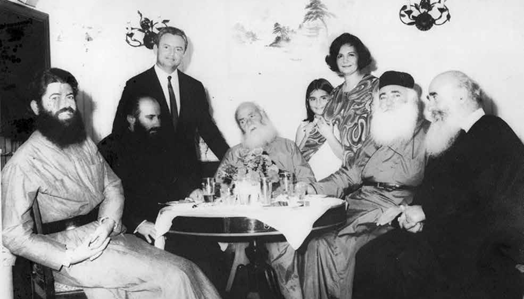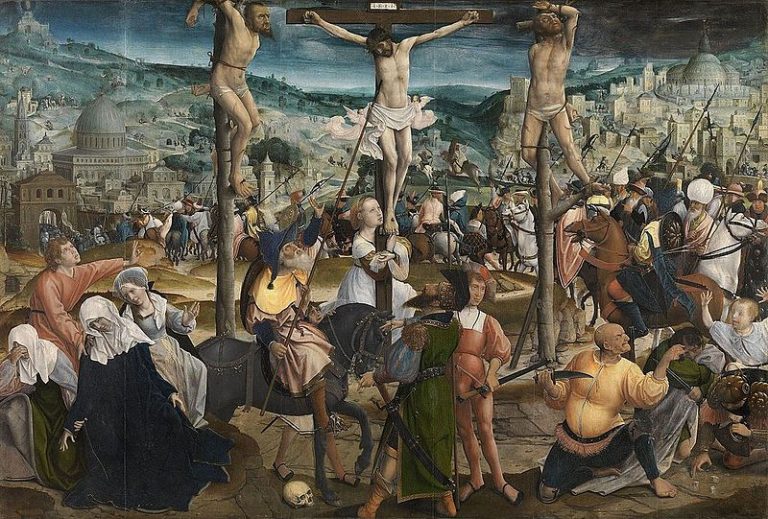Annunciation of the Virgin Mary and the Nations
In the Christmas article of our missionary synaxis we mentioned that the incarnation of the Lord Jesus Christ is a supreme missionary and at the same time divine act… Therefore, His conception in the womb of the Virgin marks the beginning of the Divine work, the activation of the plan of the Divine Economy for the purpose of the evangelization of the nations. But this great event presupposed a man whose attitude and response were marked by all the exclamations, cries and hymns that men can write, sing or read, without ever achieving a praise equal to her greatness. She is the Virgin Mary, whose attitude has been highly instructive for missionary men and at the same time salutary for the world. Let us study her:
- And in the month that followed the angel Gabriel was sent by God into a city of Galilee, called Nazareth, unto a virgin, a man named Joseph, of the house of David, and the name of the virgin Mary. 1. Theostaltos the angel Gabriel. The Almighty chooses a virgin, pure, struggling, pure woman to make her His throne, His home and intimate, His mother in the flesh, a protagonist in His missionary work and all things intercessor for the salvation of the world. What does this teach us, all of us who strive to spread the gospel to the ends of the earth, or are possessed by such a desire? That the ministry of mission does not begin the moment the work is somehow begun, but from much earlier. It has its basis in the preparation and cultivating our soul by persevering in chastity, by avoiding fornication, by the personal relationship we ‘build’ with the Saviour through the sacraments, prayer, exercise, culminating in wholehearted love in His person. “The modest daughter of Nazareth was the first to love God so much that she desired to consecrate her virginity to Him. And her desire was so strong that it remained irrevocable even after the angel’s amazing announcement”, 2
- “And the angel came in unto her, and said, Hail, O joyful one; the Lord is with thee; blessed art thou among women: and she that saw it was troubled because of this, and wondered how great was this salutation.” 3. So here is one more virtue of the Virgin necessary for missionary people. The humiliation. He struggled for years in practice and purity. An angel of God appears to her and greets her with the amazing “gifted”, that is, endowed with the grace of God. And she doesn’t stop there, but goes on to say: “the Lord God is with you” – one would say – as it was with all those prophets and righteous men whom the Virgin Mary admired while studying the Old Testament. Finally, the angel reaches the climax of the acclamation, confessing to the young girl: “you are blessed by God more than all women”. And the Virgin, instead of boasting, instead of exalting her youthful ego to the ethereal, humbly “contemplated the despicable one, this is the one who has been kissed.” If such was the thinking of the most wonderful man on earth, how much more so we – who are engaged in missionary work – ought to have a humble mind and the assurance that whatever good we do comes from God and is done by His grace, while whatever evil and whatever fault we commit is the result of our own inability, weakness or passion.

- “And the angel said unto her, Fear not, Mary: blessed be the grace of God: and behold, thou shalt conceive a son in the flesh, and call his name Jesse.This man is great, and the son of the most high is called, and the LORD God shall give him the throne of David his father, and he shall reign over the house of Jacob for ever, and there shall be no end of his kingdom.And Mary said unto the angel, How is this unto me, seeing I make not a man? and the angel answered and said unto her, The Holy Ghost cometh upon thee, and the power of the most high shall overshadow thee: therefore shall the holy man that is born be called the Son of God.And behold Elizabeth thy kinswoman, and she also shall have a son in her old age, and he shall not be without her, that is called barren; for he shall not be able to do any thing beside God.” 4. Don’t be afraid, Maria! You will conceive and bear a son who will take the throne of David and rule Israel forever! Hearing the Archangel’s uninterpreted words, Mary reasonably wonders; how will this happen if she does not know a man, i.e. she is pure? And God’s envoy willingly clarifies: “The Holy Spirit is upon thee, and the power of the Most High overshadoweth thee; therefore the Holy One that is born is called the Son of God”, prompting St. Gregory Palamas to comment: “But there is something more in what is said by the archangel to the Virgin, which contains a greater mystery, ‘There shall come,’ he says, ‘the Holy Spirit upon thee, and the power of the Most High shall overshadow thee.’ Why? Because the one to be born is neither a prophet nor merely a man, like Adam, but will be called the Son of the Most High, the saviour and redeemer of mankind and king eternal” 5. The unfathomable mystery of the Archangel’s words is aptly captured in the troparion of the feast: ‘Today is the head of our salvation and the revelation of the mystery from eternity; the Son of God, the Son of the Virgin becomes and Gabriel evangelizes grace. And we with him shall help the Virgin Mary: salute thee, O crucified one, the Lord is with thee. And St. Gregory continues by emphasizing the saving work of Jesus: “For this reason neither angel nor man came, but the Lord God Himself came and saved us, who was conceived and became flesh in the womb of the Virgin and remained God forever” 6 Let us not forget that the one who saves is Christ through His conception, incarnation, sufferings and resurrection, and not us humans. Let us be careful lest, having some power, we present ourselves as demigods, diminishing in the souls of men the divinity of Jesus. Our Christ is not one of many gods, nor is Orthodoxy one of many options! Let us experience and fervently preach that it is possible to obtain the exclusivity of a true relationship with God only through the Orthodox Church.
- “And she said unto Mary, Behold the handmaid of the LORD, open unto me according to thy word. And the angel came from her.” 7. Here is the reason that allowed the conception, according to St. Nicholas of Kavassila 8.Here is the beginning of the work of incarnation and, by extension, of the salvation of the world. “What then does the graceful Virgin do to these things?”, asks Gregory Palamas rhetorically, and immediately gives the answer: “Again she runs to God and addresses Him with a wish, saying to the archangel. If, as thou sayest, the Holy Ghost come to me, to purify me more and to strengthen me to receive the saving embryo, if the power of the Most High overshadow me, who shall form in me according to the man who bears the form of God, and shall create an unclean lotus, if that which is born shall be holy and the Son of God and God and King eternal, surely nothing is impossible for God, “Behold, I am the handmaid of the Lord, let it be according to thy word.” And the Angel departed thence, having left in her bosom the poet of the universe attached to a body, and having by this congruity, which he served, brought about the salvation of the world…” 9
Just as the Virgin Mary, after having surrendered herself to the providence of God, claimed her Evangelization – that is, she received the most joyful, the most shocking news that heaven ever whispered to earth – so we, too, need to surrender ourselves to the providence of God, to stand by His side, to ask Him to strengthen us in our ministry and to support us in our efforts to achieve the Evangelization of the Gentiles…

The Annunciation of the Virgin Mary is celebrated on 25 March each year.
Notes
- Luke. 1:26-27
- Stergios Sakkos, Interpretation of the Gospel of Luke, ed.
- Luke. 1:28-29
- Luke. 1, 30-37
- Benedictus Ieromonachos, Palamikon Taminion, ed., “Companionship of Spyridon Ieromonachos”, Mount Athos 2007, p. 338
- Venedictus Ieromonachos, Palamikon Taminion, ed.
- Luke. 1,38
- Nicholas Kavassila, In the Annunciation of the Most Holy Virgin Mary, P.Nella, The Theomitor, “Apostolic Deaconship”, Athens 1995, p. 133
- Venedictus Ieromonachos, Palamikon Taminion, ed. “Synodia Spyridonos Ieromonachos”, Mount Athos 2007, p. 343.




